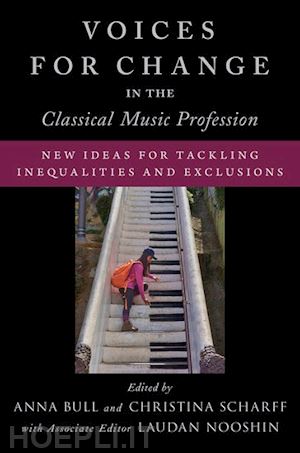
-
DISPONIBILITÀ IMMEDIATA
{{/disponibilitaBox}}
-
{{speseGratisLibroBox}}
{{/noEbook}}
{{^noEbook}}
-
Libro
-
-
SPEDIZIONE GRATUITA
- Genere: Libro
- Lingua: Inglese
- Editore: Oxford University Press
- Pubblicazione: 05/2023
Voices for Change in the Classical Music Profession
bull, anna; scharff, christina
38,98 €
37,03 €
{{{disponibilita}}}
Disponibilità Normalmente disponibile in 20 giorni
NOTE EDITORE
How is the classical music industry responding to the challenges of #MeToo, Black Lives Matter, and other social justice movements? Is increasing attention to equity and diversity in the classical music profession over recent years leading to systemic change? In this book, scholars, activists and musicians from countries across Europe and North America analyze inequalities in the classical music profession and introduce strategies for making change. Exploring racism, class and gender inequalities, disability representation, "authenticity", changing the canon, and neoliberalism, the book brings together analyses from academics alongside contributions from musicians and industry leaders working in the classical music industry who reflect on issues of diversity and share insights and best practices. Themes of the book include institutional legacies and possibilities for change; racial, classed and gendered inequalities and marginalised voices; and strategies for activism, whether reflective practices, informal networks, or larger organisations leading change. The book also discusses questions such as whether musical change is necessary for social change in classical music, and how activists can acknowledge structural inequalities whilst holding on to the possibility of change. Opening up the interdisciplinary field of "classical music studies," this book lays the groundwork for empirically-founded, theoretically-informed, and practice-based approaches to tackling inequalities in the classical music profession. As such, it will be a significant point of reference for musicians, students, classical music administrators, policy-makers, teachers, and academics -- and anyone else who wants to make classical music more inclusive.SOMMARIO
1 - Class and Gender Inequalities in the Recruitment of Classical Musicians: Reflections on the Case of Italian Music Conservatoires2 - The Role of Music Conservatoires in the Making of Classical Music Careers3 - Social Inclusion in Contemporary British Conservatoires: Alumni Perspectives4 - Inside Looking In: Strategies to Counteract Misconduct in Artistic Teaching within Higher Music Education5 - (Un)settling Institutional Hegemony: Challenges of Diversity Strategies in the "Western" Classical Music Sector6 - "To Share Music with Children": The LA Phil and Neoliberal Philanthropy in Inglewood7 - A Critical Perspective on Diversity and Inclusion in US Classical Music Discourse8 - Staging a Loose Canon: Scripture, Tradition, and Embedded Exclusion in Opera Production9 - Disability Representation in Opera10 - Gender and Class: An Account of a Female Percussionist in the Classical Music Industry11 - Making Space for Disability and Music to Interact: An Interview with Composer Oliver Vibrans12 - Black on the Podium: An Interview with Conductor Brandon Keith Brown13 - Creolization, Mixing, and Plurality: An Interview with Composer Hannah Kendall14 - The New "Yellow Peril" in "Western" European Symphony Orchestras15 - Irreconcilable Senses of Belonging: Transnational Japanese Artists in the Quest for Authenticity in the World of Classical Music16 - [Re- ]training Classical Musicians Toward Polymusicality and Hybridization: An Interview with Jon Silpayamanant17 - Inclusion and Diversity in the Early Music Scene in the US: A Conversation with Patricia Ann Neely18 - On Leaving Classical Music: An Interview with Anthony Gray19 - (Dis)orient Yourself!: Disrupting White Ontologies in Classical Music20 - Everyday Bridges: A View from the Field21 - Illuminating Women's Music: Exploring the Canonic Ethos behind the Illuminate Women's Music Concert Series22 - Changing Classical Music from the Inside: An Interview with Chi- chi Nwanoku23 - (Un)Silencing Blacktivism in Opera: An Interview with Quodesia Johnson about the Letter to the Opera Field from Black Administrators24 - Reflecting on the Work of Gender Relations in New Music: Institutional Critique and Activist Strategies25 - Addressing Inequalities in the Music Industry before, during, and after COVID- 19: The Campaigning Work of the UK's Independent Society of Musicians26 - "A Community of 30,000 Musicians behind You": An Interview with John Shortell from the UK Musicians' UnionAUTORE
Anna Bull is Lecturer in Education and Social Justice at the University of York. A former professional pianist and cellist, her research interests include class and gender inequalities in classical music education and staff sexual misconduct in higher education. Her monograph Class, Control, and Classical Music (2019) was joint winner of the 2020 British Sociological Association Philip Abrams Award. Anna is also a co-founder and director of The 1752 Group, a research and campaigning organisation working to address staff sexual misconduct in higher education. She has worked with music education charity Sound Connections on youth voice in classical music education, publishing a toolkit for teachers in 2022. Christina Scharff is Reader in Gender, Media, and Culture at King's College London. She is author and co-editor of several books, including Gender, Subjectivity, and Cultural Work: The Classical Music Profession (2018). Dr. Scharff's research on the classical music profession, funded by the ESRC and British Academy, has contributed to our understanding of inequalities in the cultural and creative industries, the subjective experiences of precarious work, and the psychic life of neoliberalism. Dr. Scharff's other area of expertise is in engagements with feminism, building on her first monograph Repudiating Feminism: Young Women in a Neoliberal World (2012). Laudan Nooshin is Professor of Music at City, University London, having previously taught at Brunel University and Goldsmiths University of London, where she gained her PhD in Ethnomusicology in 1996. Laudan's research interests include creative processes in Iranian music, music and youth culture in Iran, music and gender, urban music studies, and music in Iranian cinema. She is a co-founder and currently co-Chair of the Equality, Diversity and Inclusion in Music Studies Network and she is also a Vice-President of the Royal Musical Association in which role she leads the RMA EDI Working Group.ALTRE INFORMAZIONI
- Condizione: Nuovo
- ISBN: 9780197601228
- Dimensioni: 156 x 21.3 x 235 mm Ø 535 gr
- Formato: Brossura
- Pagine Arabe: 368
